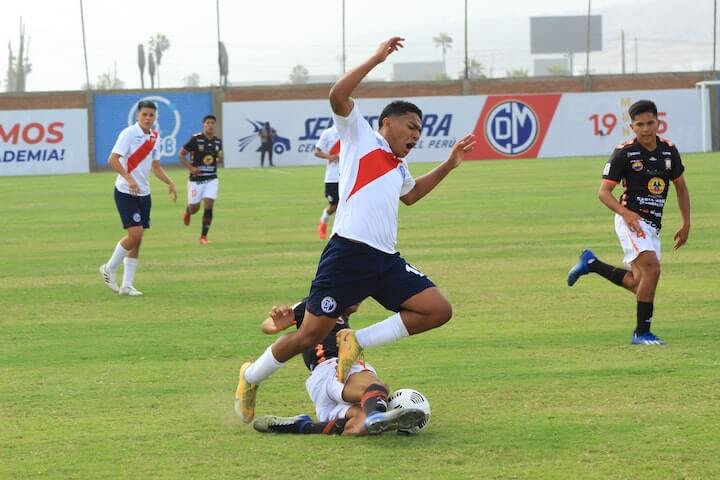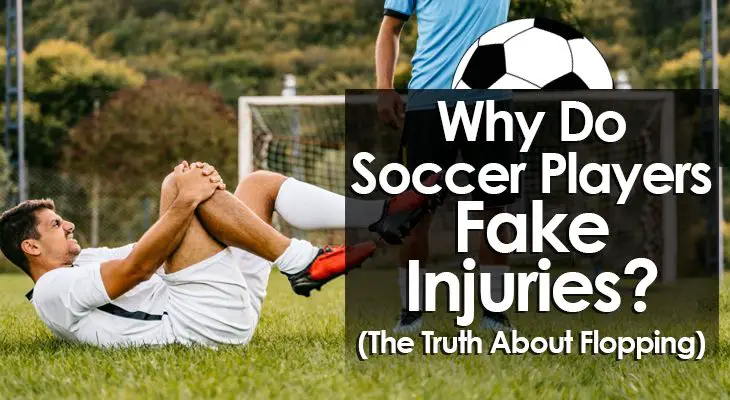Why Do Soccer Players Fake Injuries? (Truth About Flopping)
Let’s face it...
Soccer players aren’t known for being "hard-nosed tough guys."
While soccer is undoubtedly a contact sport, it’s called 'the beautiful game' for a reason.
The greatest players are known for producing moments of magic on the field, serving awe-inspiring feats of skill, and using speed and technique to overwhelm opponents.
An unfortunate byproduct of the skill-based, free-flowing nature of the game is flopping.
(Or as it’s known officially, simulation.)
This essentially means (a) faking an injury or (b) exaggerating contact to make a tackle seem worse than it truly was.
Flopping has slowly but surely infiltrated the sport and is now something that occurs in virtually every game, at all levels.
"But WHY do soccer players fake injuries?"
There are several reasons why this seedy habit has become normalized.
Let’s take a look at why this happens and then discuss a few of the methods being used to stamp flopping out of the game.
5 Reasons Why Soccer Players Fake Injuries
Unfortunately, when it comes to flopping in soccer, some of the game’s serial offenders also happen to be some of the best players in the competition.
From Neymar to Cristiano and from Messi to Mbappe, pretty much all of the world’s elite talents have been guilty of faking injuries at some point.
Although we all want to eradicate cheating from the sport, when we break down the truth about flopping, you might have some sympathy for at least some of the culprits.
(This doesn’t mean they should get away with it!)
1. To Win a Free Kick or Penalty
We’ve all seen it...
===
Player A tackles Player B.
Player B goes to the ground dramatically, tumbling over so many times an Olympic gymnast would be proud of them.
Player A looks around bemused at what has just happened.
The referee awards a free kick to Player B.
Both teams surround the referee and dish out “handbags” until it eventually calms down.
Player B receives treatment from the medical team for a few minutes before popping back to their feet and playing on as if nothing happened.
===
This happens so often that it can be impossible to tell whether or not someone is truly injured.
When these instances occur, more often than not the player who flops is the beneficiary.
You see...
At the highest level, soccer is played at blistering speed.
Anyone who’s attended a professional game in person can attest to this.
This makes officiating EXTREMELY DIFFICULT, allowing players to fall to the ground opportunistically, essentially buying a foul.
Tricking the referee into awarding a free kick can lead to a goalscoring chance from a set piece or relieve the defense from a period of sustained pressure.
In the opposition penalty box, the risk to reward payoff is huge.
Often a player will realize that they are unlikely to score or create a chance for their team so they will take on a defender and flop to try to win a penalty.
And since penalties have a 75% success rate, the risk of fooling the referee may be worth the reward for the offending player.
2. To Get an Opponent Yellow or Red Carded
This reason is somewhat of a continuation of the first...
Getting an opponent booked (yellow card) means they are a single mistake away from being sent off, which can dramatically turn the tide of a game.
So, sometimes players flop to trick the referee into giving the tackler a yellow card.
If this happens early in a game, the booked player must exercise caution to avoid picking up a second yellow and a subsequent red card.
This is why we often see players flopping when they're tackled by opponents who are already booked, attempting to get them sent off.
Although it’s totally against the ethics of the game, this is the reality.
On occasion, a player will fake an injury after an off-the-ball incident to try and get their opponent sent off.
For example, after a heated verbal exchange, one player might push the other, resulting in them falling to the ground, clutching their face, or rolling around in apparent agony.
While there’s no denying that this drama pollutes the game, shoving an opponent with force is against the Laws of the Game, so it can be an effective way to get the offender red carded.
3. To Exaggerate Contact
As a fan, you’ve probably felt the frustration of a bad refereeing decision going against your team.
Unfortunately, officials get it wrong sometimes and fail to call a foul when it is deserved.
Despite VAR being introduced to mitigate referee errors, it’s by no means a perfect system.
Players can actually lose out on a potential free kick or penalty by attempting to stay on their feet and play on after a foul.
Because they didn’t go down, the referee may not notice the foul, resulting in the player being punished for their honest effort.
In recent decades, a trend has emerged where players *exaggerate contact* to ensure officials notice they’ve been fouled.
Although you can likely understand why a player might do this, it’s important to note that not all contact warrants a foul.
Exaggerating contact has blurred the lines between fair and illegal clashes, causing constant debates over what is and isn’t a foul.
Inconsistent refereeing decisions haven’t helped the cause and frequent changes to the VAR protocols mean we aren’t much further along in solving the issue.

4. To Gain a Psychological Advantage
Mentality goes a long way in all professional sports.
Prevailing in the psychological battle is often the difference between winning and losing when two evenly matched sides face off.
Sir Alex Ferguson was renowned for his mental warfare against other coaches throughout his illustrious career, often winning games before kick-off.
Through public comments, pre-game tunnel routines, and his intimidating presence, he got inside the mind of other coaches and players.
His antics caused Rafa Benitez to go on an infamous rant about “facts” ahead of a clash between Manchester United and Liverpool, showing obvious signs of frustration.
Whether from the coach or individual players, psychological tactics also occur on the field.
Certain teams, like Diego Simeone’s Athletico Madrid, are a nightmare to play against with their flopping, tactical fouls, and general menacing attitude in every single game.
Many players flop and fake injuries to frustrate their opponents and cause them to lose focus.
Once the cracks start to appear, the psychological edge begins to favor the more mentally savvy team, albeit in a distasteful manner.
5. Stopping Fast Breaks
According to the International Football Association Board (IFAB) official Laws of the Game, the referee should stop play if a player is seriously injured to ensure they can be safely removed from the field and treated appropriately.
However, referees are encouraged to let play continue until there is a natural stoppage if a player goes down with a minor injury.
If a player is dispossessed in their opponent's final third, they may be open to a fast counterattack down the other end.
Whether or not the player is fouled when they lose the ball, they may stay down, faking an injury in the hope that the referee halts play.
Since judging the degree of the injury is at the discretion of the referee at the time of the incident, this can be an effective tactic.

How Flopping is Being Eradicated
Ultimately, all the reasons for faking an injury are strategic.
Players push the limits of the rules and beyond, finding any way they can to gain an advantage.
However, as one of the uglier aspects of the game, there are measures in place to reduce the number of flopping incidents and to discourage players from faking injuries to deceive referees.
a. Yellow Cards
Despite so many players getting away with flopping, it is strictly against the rules.
Flopping -- or simulation as it’s officially known -- is considered unsporting behavior.
If a referee deems that a player has flopped, they should award a free kick against the offender and give them a yellow card.
Although yellow cards are awarded from time to time, it’s more common to see referees allow play to carry on when they think a player has gone down too easily.
This is because it can be hard to tell whether a player is actually faking an injury or if they simply fell to the ground under a legal challenge.
While this approach helps prevent teams from losing out to cheaters, it doesn’t punish the offenders.
Many pundits and fans have called for the big leagues to introduce committees to review flopping incidents after games and hand out retroactive bans to those found guilty.
However, this hasn’t come to fruition for the most part.
b. VAR
One of the most effective methods for catching and punishing simulation is VAR.
When the referee awards a penalty, the VAR officials check the incident to ensure it is correct.
If they find that the player flopped to earn the penalty, they either instruct the referee to reverse the decision or invite them to watch a replay on the sideline monitor to reconsider.
The VAR process is slightly different depending on the league or competition.
Unfortunately, VAR isn’t used specifically to catch flopping so many players get away with faking injuries unless there was a serious incident, such as a penalty or a sending-off offense.
Although VAR has been used for several years, they are continuing to make tweaks to find the best way to assist referees without disrupting the flow of the game.
Perhaps we will see more intervention to eradicate flopping in the future.
c. Tarnished Reputations
Serial floppers develop reputations for going to the ground easily.
In some cases, player "reputations" come back to haunt them as referees may be aware of their dramatic habits and refrain from calling a lot of fouls against them.
It’s worth noting that referees aren’t supposed to be biased...
However, they're given the freedom to read the game and use their intuition to moderate as best they can.
Players like Neymar, Ashley Young, and Luis Suarez have had several high-profile incidents of simulation that have come back to bite them, with referees often hesitant to call fouls if they go down dramatically.
Conclusion
The reasons why soccer players fake injuries are all centered around the will to win.
However, this doesn't make cheating okay.
To a certain extent, flopping has been normalized in modern soccer.
Here’s hoping the governing bodies will step up their efforts to prevent cheating from having such a big impact on the game.

